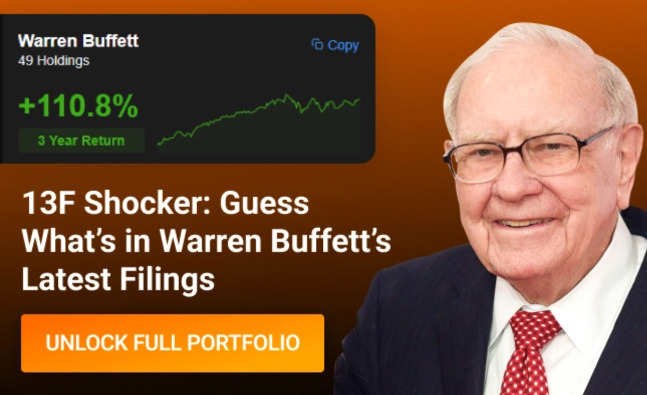- Q2 2023 13F filings are out, providing insights into market moves during the 3-month period
- Buffett moves into the homebuilders sector
- Burry's bearish actions contrast with hedge funds' tech embrace
13F reports for Q2 are out, bringing more clarity on what the biggest funds and investment companies in the market bought and sold during the 3-month period spanning from May to June, which encompassed a roughly 9% rise in the S&P 500.
For those unfamiliar with 13F filings, these are reports that institutional investment managers overseeing assets exceeding $100 million must submit to the United States Securities and Exchange Commission (SEC) on a quarterly basis.
These documents reveal the investment manager’s retained holdings in publicly traded securities, encompassing stocks and exchange-traded funds (ETFs), as of the conclusion of the preceding quarter before the filing date.
For retail investors, however, 13Fs offer a great window into a fund manager’s strategy and how they had been viewing the market during the reported period.
In Q1, investors took advantage of the banking crisis and the prolonged Chinese economic slowdown to add stocks from within both those topics to their portfolios. For more insights on their actions, read my piece on Q1 13fs here.
In Q2, however, the bull market took off, and investors were faced with the challenge of repositioning their portfolios. Let’s take a look at some of the biggest happenings of the quarter.
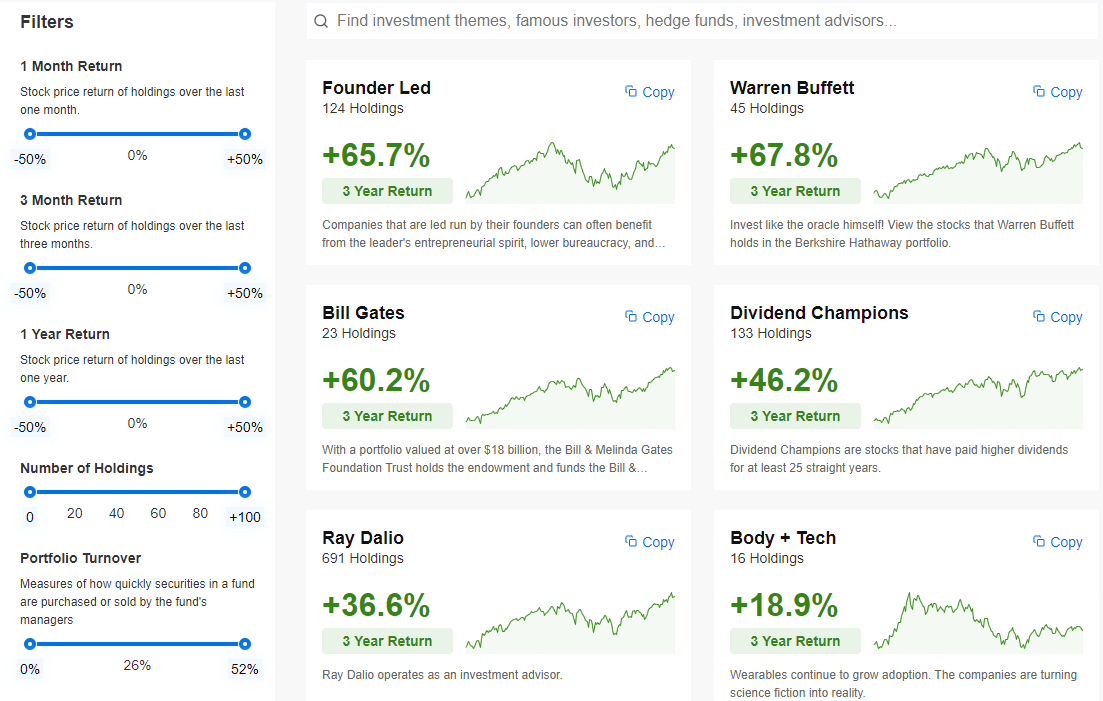
Source: InvestingPro
By the way, InvestingPro grants you access to the 13Fs of every major investor operating within the US at the click of a button. By just clicking on “ideas” and then choosing the name of the fund manager you want more information on, investors will have access to their SEC filings — along with other relevant data from their holdings, such as Ranking Tables, Sector Concentration, and Holdings Summary.
Burry Sells China, Goes Full Bear on the S&P 500 Again
Burry's Scion Capital hedge fund, in its turn, adopted a bearish perspective encompassing both the broader market and the tech sector. The company purchased 20,000 put options on the SPDR S&P 500 (NYSE:SPY) at an approximate cost of $2.25 per contract, alongside an equal number of put options against the Nasdaq via the Invesco QQQ Trust (NASDAQ:QQQ) at a rough cost of $2.70 per contract.
Source: SEC
The bearish QQQ trade underscores Burry's anticipation that the current AI-driven enthusiasm may wane, potentially causing some of the gains witnessed in the SPY during the same period to lose momentum.
These actions underscore Burry's contrarian philosophy at a time when everyone else was buying tech as if there was no tomorrow. Moreover, considering Burry's acquisitions in Q1, investors could also view these moves as hedging.
In the stock spectrum, Burry also exited several prominent positions. Notably, he divested his entire 250,000-share holding in JD (NASDAQ:JD).com, a stock that previously represented 10.26% of his portfolio.
Similarly, Burry liquidated his 100,000-share stake in Alibaba (NYSE:BABA), which had previously constituted 9.56% of his portfolio, with an average quarterly trading price of $87.76.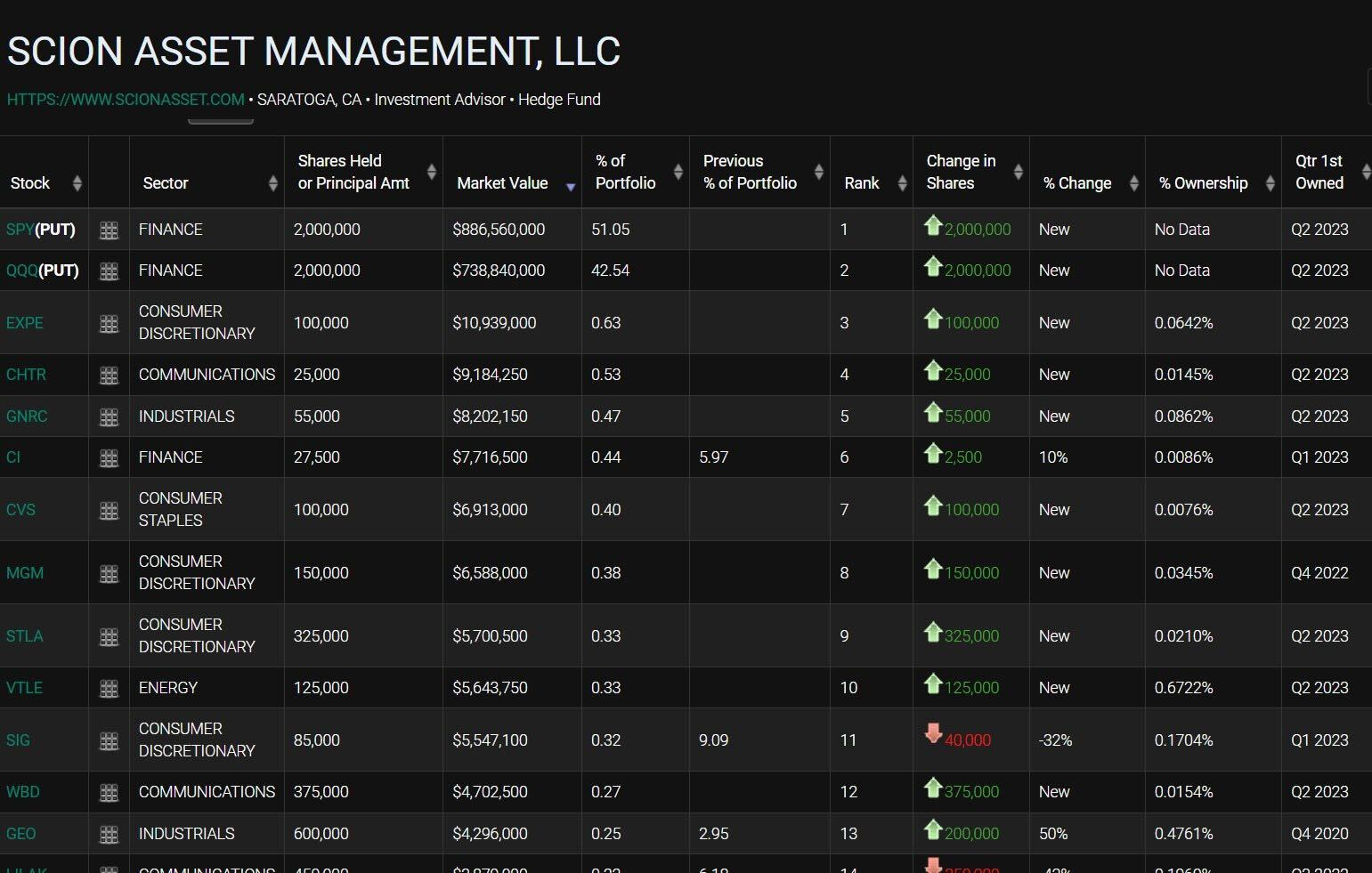 Source: Scion Asset Management
Source: Scion Asset Management
Completing these strategic maneuvers, Burry exited his 100,000-share investment in Zoom Video Communications (NASDAQ:ZM). This stock, once a 6.91% component of his portfolio, sustained an average quarterly trading price of $66.97.
Hedge Funds Buy Up AI Rally, Shun Energy
Contrary to Burry, hedge funds bought up prominent technology giants during the quarter, aiming to capitalize on the sector's surging rally and the widespread AI buzz.
According to Bloomberg, institutional investors boosted their holdings in Meta Platforms by 5.7 million shares during the quarter, amounting to a significant market value of $6.7 billion -- by far the most acquired stock by hedge funds during the period.
Additionally, in a move contrary to Michael Burry's, institutional investors reinforced their positions in Microsoft (NASDAQ:MSFT) and Apple, adding fuel to the rally that overtook the market by storm in the reported period.
In terms of sectors, technology held the most substantial weighting in institutional investors' portfolios, standing at a hefty 28%, closely followed by healthcare at 16%.
Notably, investments in the energy sector experienced the most significant decline across all industries, displaying that hedge fund managers did not anticipate the rise in oil prices that followed.
Buffett Buys Up Real Estate, Ditches Activision Blizzard
Legendary investor Warren Buffett saw the Q2 bull market as an opportunity to change market strategy. First, his Berkshire Hathaway (NYSE:BRKa) took several positions in the oversold homebuilders sector, which saw an 18% rise during the period via the SPDR® S&P Homebuilders ETF (NYSE:XHB).
Despite the positive quarter for the industry, Buffett's strategic move weighs against the larger backdrop of high interest rates, a headwind for housing market activity. In that sense, the Omaha, Nebraska-based company's strategic positions may hint at an anticipatory play on the possibility of a future pivot from the Fed.
Berkshire Hathaway's largest acquisition was DR Horton (NYSE:DHI) stock, in which the company scooped up an incredible 5,969,714 shares. Alongside, BRK's purchasing of 152,572 shares in Lennar (NYSE:LEN) and 11,112 shares in NVR (NYSE:NVR) completed this strategic triad.
The Buffett-led company also amplified its position on Capital One Financial (NYSE:COF) and Occidental Petroleum (NYSE:OXY), another pre-emptive move that appears to have paid off almost instantly with rising oil prices in Q3.
The calculated leap saw COF holdings surge from 9,922,000 shares to 12,471,030, while the OXY position broadened from 211,707,119 shares to an assertive 224,129,192 shares.
On the other side of the equation, Buffett appears to have taken advantage of the broader bull market to ditch many positions.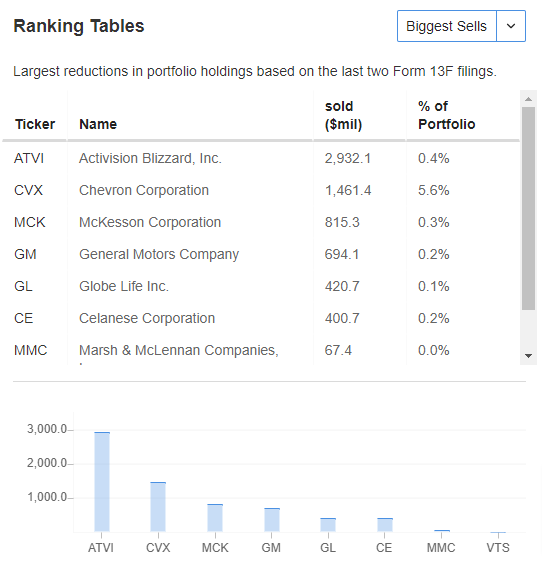
Source: InvestingPro
The company sold off Activision Blizzard, (NASDAQ:ATVI), Celanese (NYSE:NYSE:CE), Chevron (NYSE:NYSE:CVX), General Motors (NYSE:NYSE:GM), and Globe Life (NYSE:NYSE:GL).
Moreover, the conglomerate completely exited Marsh & McLennan Companies (NYSE:MMC), McKesson Corp. (NYSE:MCK), and Vitesse Energy (NYSE:VTS), charting an unswerving course towards recalibration.
BRK's carefully orchestrated maneuvers did not change the larger landscape of its portfolio. As of the end of Q2, the conglomerate still held 915,560,382 shares in Apple (NASDAQ:AAPL), reflecting Buffett's steadfast commitment to the tech giant, which plays a crucial role in its broader investment strategy.
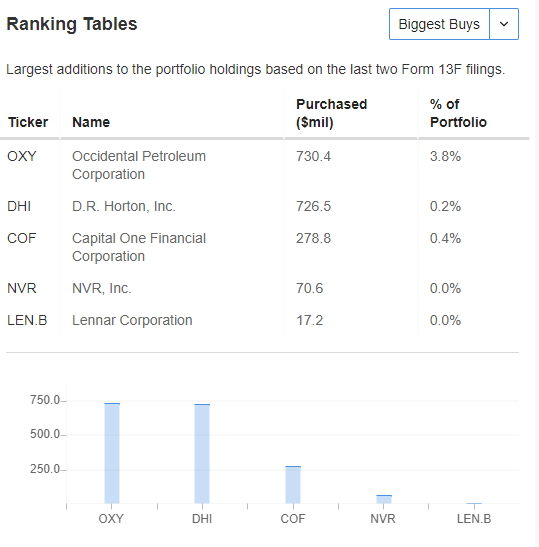
Source: InvestingPro
By the conclusion of Q2 in 2023, Buffett's holdings encompassed 49 distinct stocks, collectively valued at $348.19 billion. Preeminently positioned within this portfolio were Apple, with a commanding share of 51.00%, followed by Bank of America Corp (NYSE:BAC) at 8.51%, and American Express (NYSE:AXP) at 7.59%.
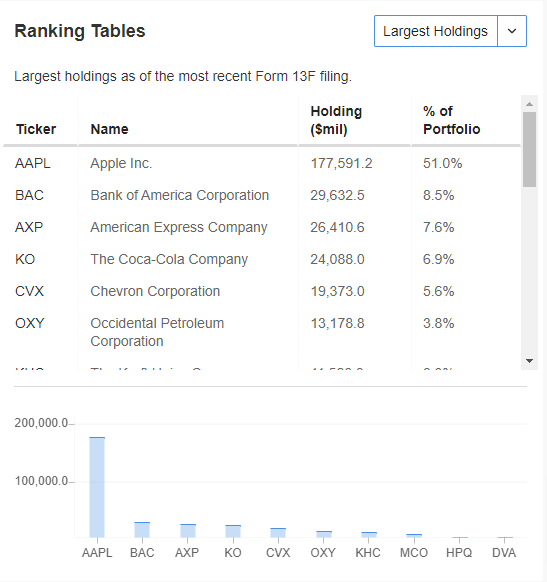
Source: InvestingPro
***
Disclosure: The author holds long positions in Apple, Microsoft, and American Express.

